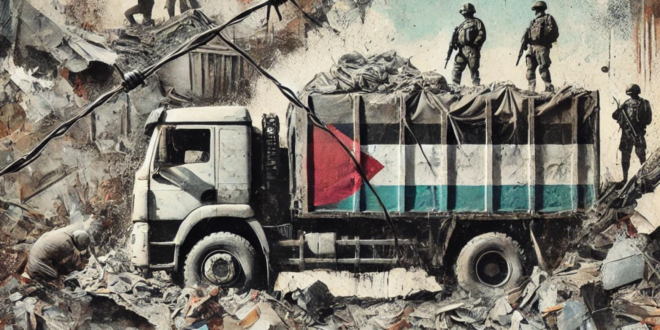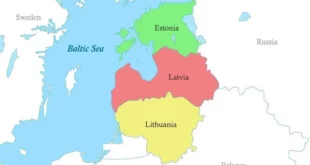Two months into Israel’s total siege and now on the cusp of an Israeli campaign for the reconquest of Gaza, Palestinians in the enclave are trapped between starvation and a battle for survival.
As Tel Aviv wields aid as a tool of war and collective punishment, no humanitarian aid has entered the Gaza Strip since 2 March, when a full blockade was imposed on the Palestinian territory, the longest halt of aid deliveries to the Strip since Israel launched its brutal war in October 2023. It has closed all border crossings into Gaza, stopping the entry of food, water, fuel and medicines, and later resumed its military offensive, ending a two-month ceasefire with Hamas.
The situation has led to the exhaustion of essentials and food stocks in markets and aid agencies, triggering the “worst-case scenario,” according to the UN’s humanitarian affairs coordination office (OCHA).
Most shops in Gaza are nearly empty, and food prices have surged to stratospheric levels. Gaza residents say a kilo of tomatoes is $10 now, a kilo of rice costs $15, and the price of flour has reached $350 per bag.
Most families struggle to provide the basics for their children. Many are forced to get by on a single daily meal as food supplies run out. People mainly live off canned food, while staple items like dairy, meat, eggs, and fruits have disappeared from market shelves.
“We eat one meal daily, dividing bread among each person. We eat canned goods, lentils, and rice”, Um Muhammad, a woman staying at a shelter in Gaza City, said.
“We don’t ask if food is nutritious or not, if it’s fresh or good; that’s a luxury, we just want to fill our children’s stomachs,” one displaced parent told Amnesty.
“The hunger is spreading everywhere. All of our children, sons, neighbours and relatives are hungry in Gaza, their bodies and faces are changing”, an aid worker added.
In addition, fuel is unavailable. “People are not only unable to get food, but they also lack the means to cook it,” Ghada Alhaddad, Oxfam’s media and communications officer in Gaza, commented while speaking to The New Arab (TNA).
She remarked that Palestinians in the besieged territory cannot produce their own food either, as Israeli forces have rendered most of their agricultural land unusable, either by destroying it through bombardment and bulldozing or by isolating it for potential annexation into buffer zones.
“Israel is trying to eat up these lands through the expansion of buffer zones”, Gaza’s communications officer affirmed, citing routine evacuation orders and escalating bombardment that enable the Israeli military to seize more territory. “This is another method of starving Palestinians by hindering their ability to cultivate their lands”, she said.
Healthcare system on the brink
The UN’s World Food Program said two weeks ago that it had fully depleted its food stocks in Gaza. Bakeries have shut down as flour and fuel have dried up, and hot meal kitchens are expected to run out of food completely within days.
“In less than a week, these kitchens will be closed”, Amjad Shawa, Gaza-based director of the Palestinian Non-Governmental Organisations Network (PNGO), told TNA, counting 70-80 community kitchens still working in the Strip.
The humanitarian advocate pointed to child malnutrition as the most pressing issue, affecting nearly all children and causing irreversible harm for many, as the aid blockade persists. He added that Israel’s ban on medical supplies has stopped the entry of polio vaccines, putting 600,000 children at risk of permanent paralysis.
UNICEF said children face “a growing risk of starvation, illness and death” as Israel’s protracted shutdown entered its third month. The UN’s child rights agency identified more than 9,000 cases of acute malnutrition among children since the start of the year.
“Any use of starvation of the civilian population as a method of war constitutes a war crime, and so do all forms of collective punishment,” UN High Commissioner for Human Rights Volker Turk warned.
Beyond the depletion of food supplies, hospitals are out of essential items, which is forcing them to portion out what’s left to continue life-saving care. Without urgent resupply, they will struggle to deliver much-needed medical care to patients at a time when the number of injured in mass casualty incidents keeps rising.
On Sunday, Gaza’s Health Ministry announced that fuel reserves in the enclave’s hospitals will last three more days.
Not only that, Israel’s repeated attacks continue to disrupt healthcare services and put medical staff at risk. An Israeli air strike last month incapacitated al Ahli Arab Hospital, the last fully functional medical facility in Gaza City. 18 of 36 hospitals across the territory are completely out of service.
Targeting of health facilities and medical personnel constitutes a blatant violation of international humanitarian law.
International law violated
Due to the crisis, water, sanitation, and hygiene conditions have also severely worsened. Damage to water infrastructure has significantly heightened the risk of waterborne diseases.
The head of PNGO said, “We’re a few days away from the collapse of the humanitarian structure.” This raised the alarm about the height of the emergency.
As the ban on aid persists, relief teams are doing all they can to reach people with whatever limited supplies remain. For now, supplies of food and other essentials are stuck at Gaza’s border crossings, waiting to be delivered as soon as the borders reopen, while inside the enclave, aid workers are rationing the last of their stocks.
UN emergency relief coordinator Tom Fletcher strongly denounced Israel’s suspension of humanitarian assistance, calling it a “cruel collective punishment” of the Palestinian people. He noted that Israeli officials have been strikingly candid about using this policy as a means to exert pressure on Hamas.
“Lift this brutal blockade. Let humanitarians save lives”, the UN relief chief appealed to the Israeli authorities.
Under international humanitarian law, Israel has an obligation to take all necessary measures to ensure the basic needs of the civilian population under its control are met, and therefore allow unimpeded passage of relief supplies.
In an interview with TNA, Heidi Matthews, an assistant professor of law specialising in international criminal law, indicated: “It is obliged to agree to relief schemes by international organisations and third states”, which are neutral and impartial in nature.
The law scholar spelt out how Israel’s extended use of starvation as a method of warfare would also amount to an act of genocide, besides being a war crime. “Deliberately using starvation through a prolonged siege is strong evidence that Israel is intentionally creating conditions aimed at the physical destruction of Palestinians”, she said.
Matthews reminded that third-party states and the UN are obliged to end Israel’s unlawful presence in the Palestinian territories, referring to the General Assembly’s resolution adopted in September 2024 demanding an end to Israel’s occupation.
She also reiterated that the resolution urged member states not to recognise Israel’s presence in the territory as lawful or support its occupation, to cease imports from Jewish settlements and arms transfers to Israel where misuse in the occupied territory is suspected, and to apply other economic and political measures necessary to ensure respect for international law.
Mass starvation is looming
The Israeli cabinet approved on Sunday a plan to permit limited aid into Gaza “if necessary”. Under the controversial proposal, the Israeli military retains control over distribution and access to recipients. The proposed aid delivery system would route humanitarian supplies through military-controlled hubs, limiting the ability of UN agencies and NGOs to operate independently.
The UN and humanitarian agencies have decried the scheme, saying it “contravenes fundamental humanitarian principles”, and warning it allows Israel to use aid as a tool to achieve military objectives and to ease further displacement of Palestinian civilians.
“The aim of the Israeli mechanism is to weaponise aid, to sustain and deepen this humanitarian catastrophe, tightening the squeeze on every aspect of Palestinian life”, the PNGO’s director opined.
Alhaddad pointed out that this is not the first time Israel has used starvation as a weapon of war. “We’ve long witnessed starvation being systematically engineered as a tool of collective punishment against Palestinians”, Oxfam’s media staff stated.
She highlighted the risks faced by humanitarian workers on the ground and the challenges posed by Israel’s relief ban, urging a permanent ceasefire and full border reopening to enable relief groups to reach those in need.
Tel Aviv tightly controls vital international aid, even as ongoing bombardment has displaced most of the 2.3 million Palestinians in the Strip and killed over 52,000.
International aid organisations are intensifying calls urging a deal that would see Israel agree to a ceasefire and lift its siege, warning that mass starvation is looming.
“We’ve received expressions of concern from the international community, but Gaza needs action, ” Shawa said. He flagged the danger that the prolonged aid stoppage would result in thousands dying from starvation.
 Eurasia Press & News
Eurasia Press & News



